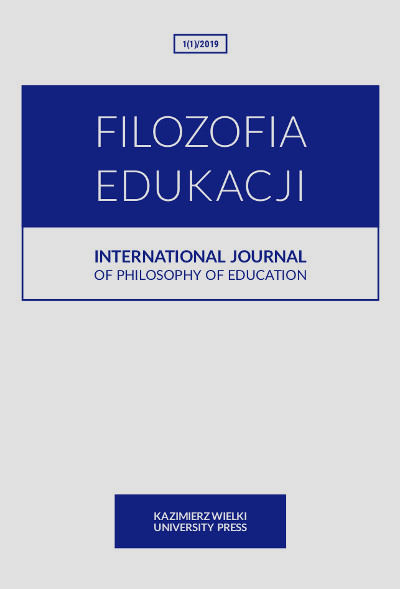An Immanent Account of Teaching. A Clarification on Affirmation, Politics, Love, Ontology, and Ethos
DOI:
https://doi.org/10.34767/FE.2021.03.01Słowa kluczowe:
teaching, ontology, politics, affirmation, love, ethosAbstrakt
In this article I have made an attempt to give an account of what the project of an immanent ontology of teaching entails, at the same time dealing with some misgivings that arouse in the wake of the publication of our book. Therefore, I started from the key circumstances that made the development of an ontology of teaching a necessary task. The simultaneous disappearance of the common world from our sight, the risk of losing a strictly educational research interest in education, and the functionalisation of education pose a real danger to the very existence of education. To avoid this, it is requisite to engage in an affirmative way of doing educational research, which is aimed at expressing the essence of suppressed educational practices. One of these being teaching. After that, I synthetised the argument developed with Zamojski in Towards an Ontology of Teaching into a five theses. Finally, I responded to potential and actual criticisms of this position by restating the fundamental tenets of an immanent ontology of teaching: affirmation, the relation between education and politics, educational love, ontology and ethos.
Bibliografia
Agamben G., Potentialities. Collected essays in philosophy, Stanford University Press, Stanford 1999.
Arendt H., The Crisis in Education, [in:] eadem, Between Past and Future: Eight Exercises in Political Thought, The Viking Press, New York 1961.
Badiou A., Saint Paul. The Foundation of Universalism, Stanford University Press, Stanford 2003.
Badiou A., Being and Event, Continuum, London – New York 2005.
Biesta G. J. J., Disciplines and theory in the academic study of education: A comparative analysis of the Anglo-American and continental construction of the field, “Pedagogy, Culture and Society”, 2011, 19 (2), pp. 175-192.
Derrida J., Writing and Difference, Routledge, London – New York 2001.
Ellsworth E., Why Doesn’t This Feel Empowering? Working Through the Repressive Myths of Critical Pedagogy, “Harvard Educational Review”, 1989, 59 (3), pp. 297-324.
Foucault M., The Hermeneutics of the Subject: lectures at the Collège de France 1981-1982, Pal grave, Basingstone 2005
Furedi F., Wasted: Why education isn’t educating?, Continuum, London 2010.
Gibbs A., O’Brien E., Out of Love for Any Thing? A Response to Vlieghe and Zamojski on Some Pedagogical Problems with an Object-Oriented ‘Educational Love’, “Journal of Philosophy of Education”, 2021, 55 (1), pp. 215-225.
Heidegger M., Being and Time, Blackwell, Oxford 1962.
Heidegger M., The thing, [in:] Poetry, language, thought, Harper Perennial, New York, NY 2001.
Hodgson N., Post-critique, politics, and the political in educational philosophy, “On Education. Journal for Research and Debate”, 2020, 3 (9), https://doi.org/10.17899/on_ed.2020.9.3
Hodgson N., Vlieghe J., Zamojski P, Manifesto for a Post-Critical Pedagogy, Punctum Books Earth, Milky Way 2017.
hooks bell, Teaching to Transgress. Education as the Practice of Freedom, Routledge, New York – London 1994.
Jonas H., The Imperative of Responsibility. In Search of an Ethics for the Technological Age, The University of Chicago Press, Chicago – London 1984.
Lewis T., A response to the ‘Manifesto for a Post-critical Pedagogy’, [in:] N. Hodgson, J. Vlieghe, and P. Zamojski, Manifesto for a Post-critical Pedagogy, Punctum Books, Goleta (CA) 2017, p. 23-34.
Masschelein J., Simons M., In Defence of the School. A Public Issue, E-ducation Culture & Society Pub, Leuven 2013.
Mollenhauer K., Umwege. Über Bildung, Kunst und Interaktion, Juventa, München 1986.
Picht G., The Concept of Responsibility, “Religion”, 1998, 28 (2), p. 185-203, DOI: 10.1006/reli.1997.0096.
Ramaekers S., Love for the World in Education, [in:] Manifesto for a Post-Critical Pedagogy, N. Hodgson, J. Vlieghe, P. Zamojski, Punctum Books, Earth, Milky Way, pp. 63-67.
Rancière J., The Ignorant Schoolmaster, Stanford University Press, Stanford (CA) 1991.
Rancière J., Politics, Identification, and Subjectivisation, “October”, 1992, 61, pp. 58-64.
Ricoeur P., Freud and Philosophy. An Essay on Interpretation, Yale University Press, New Haven – London 1970.
Ricoeur P., Interpretation Theory: Discourse and the Surplus of Meaning, The Texas Christian University Press, Fort Worth (TX) 1976.
Simons M., Masschelein J., Governmental, Political and Pedagogic Subjectivisation: Foucault with Rancière, “Educational Philosophy and Theory”, 2010, 42 (5-6), pp. 588-605.
Smeyers P., Depaepe M. (eds.), Educational research: the educationalization of social problems, Springer, Dordrecht 2008.
Vlieghe J., Zamojski P., Towards an Ontology of Teaching. Thing-centred pedagogy, Affirmation and Love for the World, Springer, Cham 2019.
Vlieghe J., Zamojski P., Towards an immanent ontology of teaching Leonard Bernstein as a casestudy, “Ethics and Education”, 2020, 15 (1), pp. 1-17.

